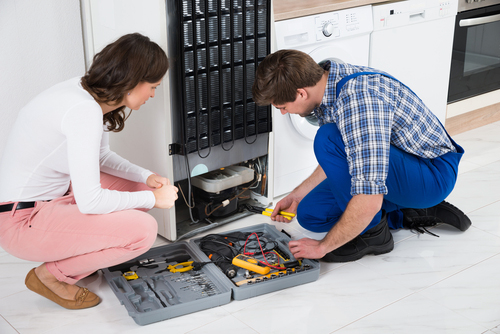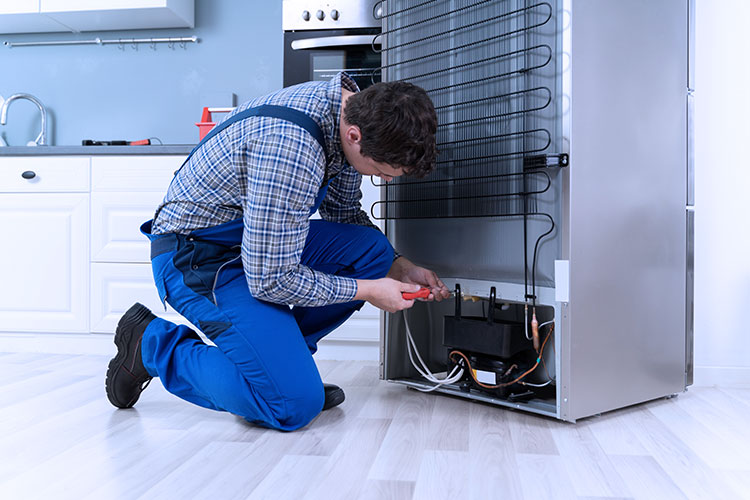Act Fast—Dependable Refrigeration & Appliance Repair Refrigerator repair specialist of Oro Valley Reveals Why Quick Fixes Matter
Act Fast—Dependable Refrigeration & Appliance Repair Refrigerator repair specialist of Oro Valley Reveals Why Quick Fixes Matter
Blog Article
Important Tips for Effective Ref Fixing to Prolong Device Lifespan
When it involves your refrigerator, appropriate fixing and maintenance are crucial for longevity. You may not understand how little concerns can escalate if they're left unaddressed. Routine exams and basic fixes can save you from costly substitutes down the line. Understanding common issues and recognizing when to act can make all the difference. Let's discover some important ideas that will certainly help you keep your fridge running efficiently for several years to come.
Recognizing Usual Fridge Problems
Fridges are necessary in keeping your food fresh, but they can come across a variety of common troubles that disrupt their performance. If you notice food ruining quicker than typical, examine the thermostat setups or think about if the door seals are damaged. Identifying these issues early can conserve you time and money in fixings, ensuring your refrigerator runs smoothly and successfully.
Routine Upkeep Practices
To keep your devices running smoothly, you require to remain on top of routine maintenance methods. Tidy the condenser coils, inspect the door seals, and check the temperature setups to ensure peak performance. These basic tasks can conserve you money and time on repair services down the line.
Clean Condenser Coils Frequently
Cleaning your condenser coils routinely can considerably boost your device's performance. Dust and dirt build up on these coils over time, causing your appliance to work harder and consume even more power. To keep them clean, unplug your appliance and carefully remove any kind of safety covers.
Inspect Door Seals
Three easy steps can help you ensure your home appliance's door seals are in great condition. Second, clean the seals utilizing warm, soapy water to remove any debris or grime. By following these steps, you'll keep your device's efficiency and durability, saving you money on power costs and fixings in the lengthy run.
Display Temperature Level Settings
On a regular basis checking your home appliance's temperature settings is important for best efficiency and performance. Whether you're taking care of a fridge, freezer, or stove, keeping an eye on these settings can prevent several concerns. For fridges, go for temperatures in between 35 ° F and 38 ° F; for fridges freezer, remain 0 ° F. If the temperatures are expensive or reduced, your home appliance may function harder, squandering energy and reducing its life expectancy. Use a thermostat to examine these settings routinely, specifically after major changes, like relocating your device or changing the thermostat. If you discover fluctuations, change the settings as necessary and get in touch with the customer manual for support. By remaining aggressive about temperature monitoring, you'll assure your home appliances run efficiently and last longer.
Repairing Air Conditioning Issues
When your fridge isn't cooling properly, it can cause ruined food and wasted money, so addressing the issue promptly is crucial. Start by examining the temperature settings to validate they go to the suggested degrees, generally around 37 ° F for the fridge and 0 ° F for the freezer. If the settings are correct, inspect the door seals for any kind of gaps or damage; a defective seal can permit cozy air to enter.
Examine the condenser coils, normally situated at the back or base of the device. Tidy them with a vacuum cleaner or brush to enhance performance. If problems persist, it could be time to call a specialist.
Dealing With Water Leak and Ice Build-Up
If you're handling water leakage or ice accumulation in your device, it's necessary to recognize the source of the problem. By determining where the water is originating from, you can stop further issues and stay clear of expensive repair work. Let's check out some effective strategies to take on these typical problems.
Recognize Leakage Sources
Just how can you efficiently identify the resources of water leakage and ice accumulation in your home appliances? Start by inspecting the seals and gaskets on your fridge and freezer doors. A used or damaged seal can permit warm air to enter, triggering condensation and ice. Next, examine the drain frying pan and drainage system for obstructions or obstructions; a backed-up drainpipe can cause water pooling. Try to find any loosened connections in the water system line, which can create leakages. Also, take a look at the defrost drain for ice accumulation, which can interrupt correct drainage. By systematically inspecting these locations, you'll pinpoint the source of the trouble, allowing you to take the needed steps to fix it and prolong your appliance's life expectancy.
Prevent Ice Formation
To stop ice formation in your appliances, start by confirming the temperature settings are proper. If your refrigerator or fridge freezer is also cool, it can lead to extreme ice build-up. Inspect the door seals regularly; damaged seals can let cozy air in, causing condensation and ice development.
Keep the appliance well-ventilated and avoid overcrowding, as this can block air movement - Best Appliance Repair Near You Dependable Refrigeration & Appliance Repair Service. Also, consistently thaw your freezer if it doesn't have an automated defrost function.
If you see water leakage, identify and fix any kind of obstructed drainage openings, as they can add to ice accumulation. Tidy the coils and verify they're operating correctly to maintain peak efficiency. Taking these steps will certainly assist extend your device's life expectancy and efficiency.
Resolving Noisy Refrigerator Appears
While it could seem startling, a loud fridge typically signifies minor problems instead than major breakdowns. Usual perpetrators consist of the compressor, fans, and water lines.
Next, examine for loose items inside. Often, containers or racks can rattle, creating unwanted sound. Tighten up or rearrange them to get rid of the audios.
If you see a clicking noise, it may be the defrost timer. This is typically harmless however might show it requires inspection.
Lastly, confirm your fridge is degree. An out of balance appliance can create vibrations and noise. Utilize a degree to examine, and readjust the feet if required. Addressing these issues quickly can aid preserve your refrigerator's efficiency and extend its life-span.
When to Change Parts vs. Complete Substitute

Consider the expense of repair services versus the dig this device's worth. Additionally, if you observe recurring troubles that maintain recurring, it's a sign that your home appliance has actually gotten to the end of its life.
Recognizing When to Call an Expert
How can you tell when it's time to call in a professional for appliance repair? If your device quits functioning entirely or often trips circuit breakers, it's an additional red flag.
You ought to likewise consider your own convenience degree with repair services. If you're not sure regarding identifying the problem or do not have the right devices, it's finest to connect for help. Bear in mind, trying complex repair work can lead to even more damages and even safety threats.

Regularly Asked Questions
Just how Frequently Should I Tidy the Refrigerator Coils?
You need to clean your fridge coils every six months. This aids maintain effectiveness and prevents getting too hot. If you notice extreme dirt or animal hair, tidy them more often to assure your fridge runs efficiently.

Can I Use Vinegar for Cleansing My Fridge?
Yes, you can use view website vinegar to clean your fridge! It's an excellent natural cleanser that gets rid of smells and spots. Washing Machine Repair Dependable Refrigeration & Appliance Repair Service. Simply blend it with water, use it to surface areas, and clean down for a fresh, tidy refrigerator
What Temperature level Should My Fridge Be Ready To?
You should set your refrigerator to 37 ° F(3 ° C) for perfect food preservation. This temperature keeps your food fresh while stopping wasting, ensuring your groceries last longer and decreasing waste. It's an easy adjustment you can make!
Does a Refrigerator Need to Be Leveled?
Yes, your fridge requires to be leveled. If it's irregular, it can impact cooling effectiveness and trigger excess noise. Check the leveling legs and readjust them to assure correct equilibrium for optimal performance.
Just How Can I Minimize Fridge Power Consumption?
To reduce your fridge's power usage, keep it clean and well-ventilated, examine door seals for leakages, set the temperature in between 35-38 ° F, and stay clear of overwhelming it. These steps can considerably decrease your power bills.
Report this page